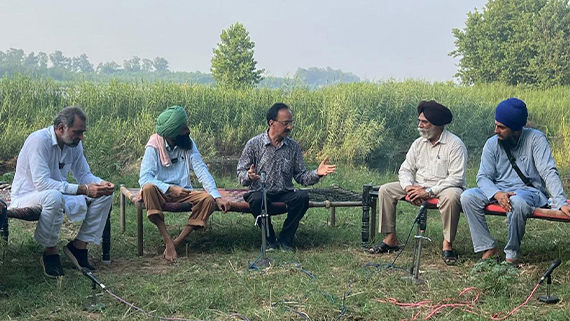Ludhiana (14 July 2024): The spotlight is once again on the severe pollution of Budha Darya, with numerous civil society and environmental groups calling for decisive measures to halt the contamination. Once a source of fresh water, Budha Darya now flows with blackened water, laden with hazardous waste from Ludhiana’s dyeing and electroplating industries, as well as sewage and cattle waste from dairies.
A view of Budha Darya is merging with the Satluj River.
A significant gathering of activists took place near Walipur village, where the polluted waters of Budha Darya merge with the Satluj River, creating a stark visual contrast and raising alarms about the ecological damage. The meeting was attended by prominent figures including agriculture economy expert Davinder Sharma, Public Action Committee’s key functionary Jaskirat Singh, Sikh Siyasat editor Parmjeet Singh Gazi, senior Punjabi journalist Hamir Singh, folk singer Kanwar Grewal, and Water Warriors Punjab activist Dr. Manjeet. The event was coordinated by Jujhda Punjab coordinator Amitoj Mann.
L to R: Amitoj Mann, Kanwar Grewal, Davinder Sharma, Harmir Singh and Parmjeet Singh Gazi
The activists highlighted the urgent need for intervention to protect both the environment and public health. They pointed out the dire consequences of continued neglect, including the loss of biodiversity, the deterioration of soil and water quality, and the potential health risks to communities relying on these water sources.
Jujhda Punjab Coordinator Amitoj Mann sharing his prespective on Budha Darya.
Their demands include stricter regulations on industrial waste disposal, improved sewage treatment facilities, and increased accountability for pollution control. They also called for comprehensive monitoring of industrial activities and punitive measures against violators. Emphasizing the importance of sustainable practices, the participants urged the government to implement long-term solutions to restore the river to its former state.
The deteriorating condition of Budha Darya serves as a grim reminder of the environmental costs of unchecked industrial activity. The renewed call for action reflects a growing awareness and determination among civil society to address the issue and safeguard the environment for future generations.

